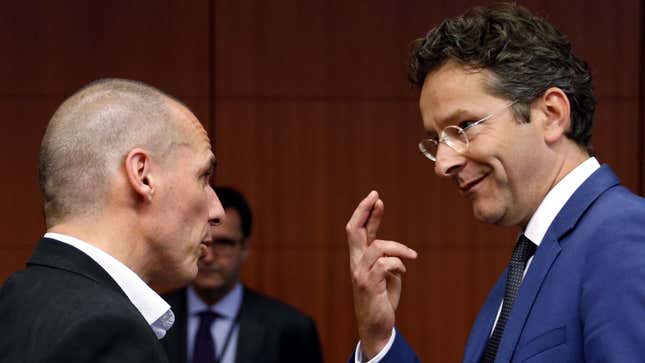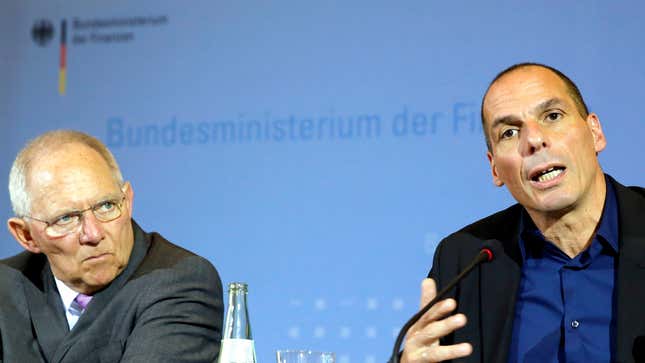You don’t need a rogue finance minister to play the “bad cop” in bailout talks when 60% of your country’s population can do it for you.
That’s one of the lessons from the resignation of Greek finance minister Yanis Varoufakis today, on the heels of his country’s rejection of an extended loan offer from the European Union, European Central Bank, and International Monetary Fund.
Greece’s financial system is now totally dependent on emergency short-term loans from the ECB, and it remains to be seen how long that will continue if Greece continues to default on its debts to lenders, which it will without another injection of bailout money.
Varoufakis campaigned for a rejection of the latest bailout offer, so his resignation was something of a surprise so soon after the decisive “no” vote. But it makes sense: Varoufakis’s role in the negotiations was as an agent provocateur, hammering home the fact that the creditors’ plan for Greece was a non-starter from the beginning.
At the final meeting of euro-zone finance ministers before negotiations floundered, Varoufakis dramatically called on Christine Lagarde, the IMF director, to point out that the latest loan program would fail without debt relief. Lagarde reportedly agreed—the IMF later published an analysis that said as much—but she was cut off by Jeroen Dijsselbloem, the Dutch finance minister who leads the group. Dijsselbloem, a frequent sparring partner with Varoufakis, demanded the Greeks take or leave the creditors’ offer, which featured only minor changes to the existing conditions required to unlock further financial aid.

The Greeks left it. And now prime minister Alexis Tsipras doesn’t need Varoufakis to make clear that his country will not go along with the status quo. Who needs Varoufakis’s rhetorical pungency—including describing the latest bailout offer as economic “terrorism“—when it’s clear that a majority of the country views the offer with similar disdain?
This is actually the second time that Varoufakis has been pulled from the negotiating table; he was removed in April as part of a calculated concession to a negotiating team dominated by Germany. Varoufakis famously said he “could not even agree to disagree” with German finance minister Wolfgang Schäuble during their first meeting in February, and their relationship never grew any warmer—”I shall wear the creditors’ loathing with pride,” he said today.

Now, Tsipras and his radical-left government must feel that they have made their point. Tsipras and his citizens want to remain in the euro zone, but an influx of cash, some relief from Greece’s debt, and a lighter austerity burden is what they need to do it, if the two sides can find some way to agree on a realistic compromise.
“Realistic,” of course, is a changing quality. For Varoufakis, economic realism is a bailout plan that recognizes that Greece cannot repay the bulk of its debts without growth and relief. For Schäuble, political realism means that writing down Greek debt is anathema for German voters, even if Greece agrees to much-needed reforms.
And to be clear, Greece needs major economic reforms. But blaming Varoufakis or Tsipras for the current state of play today is a dodge. They were not part of the political establishment that over-spent and over-borrowed, or ran the banks that lent to that political establishment, or agreed to the unsustainable first bailout in 2010 that saved those banks at the cost of Greek austerity; nor were they even part of the center-right government that, in 2014, missed the program’s deficit target by 1.5% of GDP. This is what a succession of failed bailouts looks like:
Varoufakis’s clearest mistake as a finance minister came when his government’s aggressive push for concessions from creditors led to a loss of confidence among customers in the country’s financial system. The result may have been different if the previous center-right government, instead of the current radical-left one, had revealed the program’s failure and shortfalls from targets this summer. But it seems clear that the Greek people still would not have accepted the additional austerity that creditors would have demanded in any case—campaigning on that platform is what swept Syriza to power in January elections.
It was always Varoufakis’s unwillingness to accept the stagnant norms of European politics—that Germany’s past cannot be mentioned; that ministers must be willing to push problems into the future, even if they worsen, when the solution is unpalatable—that angered his critics, more so than any dispute over appropriate structural reforms in his country. His departure from the scene strengthens those norms, but perhaps he fought them long enough for Greece to win enough political capital to get debt relief onto the negotiating table and struggle forward into an acceptable new program.
Or perhaps the banks will start failing tomorrow and Grexit will begin in earnest, with who knows what consequences. Sometimes, economics trumps politics.




